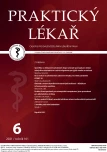EU and response to cross-border health threats in the light of the COVID-19 pandemic
Authors:
J. Malíř 1; M. Svobodová 2
Authors‘ workplace:
Ústav státu a práva AV ČR, v. v. i., Praha, Oddělení veřejného práva, Ředitel: JUDr. Ján Matejka, Ph. D.
1; Univerzita Karlova v Praze, Právnická fakulta, Katedra evropského práva, Vedoucí: prof. JUDr. PhDr. Michal Tomášek, DrSc.
2
Published in:
Prakt. Lék. 2021; 101(6): 201-308
Category:
Reviews
Overview
The COVID-19 pandemic has posed challenges not only with respect to states but also to international organisations, including the European Union (EU). In the present article, the authors focus precisely on the case of the EU. They provide an overview of powers which the EU possesses in the area of public health and they also present the recent proposals which aim at establishing the European Health Union or at better coordinating free movement of persons and goods upon the EU level. The pandemic has pointed to series of shortcomings in the functioning of the present EU system the purpose of which is to eliminate the serious cross-border threats to health. At the same time, however, the pandemic has demonstrated the importance which the cooperation between states, their mutual solidarity and the support from the EU have with regard to combatting serious cross-border health threats.
Keywords:
European Union – public health – COVID-19 – powers – European Health Union – free movement of persons and goods
Sources
1. Tomášek M, Týč V, Petrlík D, a kol. Právo Evropské unie. Praha: Leges 2021; 125–126.
2. Tomášek M, Týč V, Petrlík D, a kol. Právo Evropské unie. Praha: Leges 2021; 126–127.
3. Priollaud F-X, Siritzky D. Le traité de Lisbonne. Textes et commentaires, Paris: La Documentation française 2008; 279 –280.
4. Klamert M. Public health policy. In: Hofmann H, Rowe GC, Turk AH (eds.) Specialized administrative law of the European Union. A Sectoral Review. Oxford: Oxford University Press 2019; 405–407.
5. Bengtsson L, Rhinard M. Securitisation across borders: the case of ‘health security’ cooperation in the European Union. West European Politics 2019; 42(2): 346–368.
6. Blanc D. Unis dans l’adversité: la protection civile de l’Union, instrument d’une solidarité éprouvée par le coronavirus. Revue de l’Union européenne 2020; 638 : 270–276.
7. Haussig J M, Severi E, Baum J, et al. The European medical corps: first public health team mission and future perspectives. Euro Surveill 2017; 22(37): 30613.
8. Pooter H. de. La passation conjointe des marchés de contre-mesures médicales dans le contexte de la pandémie COVID-19. Europe 2020; 5 : 8–13.
9. Davesne A, Guigner S. La Communauté européenne de la santé (1952–1954). Une redécouverte intergouvernementaliste du projet fonctionnaliste de „pool blanc“. Politique européenne 2013; 3(41): 40–63.
10. Hofmann H, Rowe GC, Turk AH. Synthesis and Assessment. In: Hofmann H, Rowe GC, Turk AH. (Eds.). Specialized administrative law of the European Union. A Sectoral Review. Oxford: Oxford University Press 2019; 633–634.
11. Kochenov DV, Veraldi JD. The Commission against the internal market and European Union citizens’ rights: trying to shoot down Sputnik with the “Digital Green Certificate”? Eur J Risk Regul 2021; 12(2): 404–414.
Labels
General practitioner for children and adolescents General practitioner for adultsArticle was published in
General Practitioner

2021 Issue 6
- Advances in the Treatment of Myasthenia Gravis on the Horizon
- Memantine in Dementia Therapy – Current Findings and Possible Future Applications
- Memantine Eases Daily Life for Patients and Caregivers
- Possibilities of Using Metamizole in the Treatment of Acute Primary Headaches
- Hope Awakens with Early Diagnosis of Parkinson's Disease Based on Skin Odor
-
All articles in this issue
- Specifics of evidence-based practice guidelines for public health domain and proposal of an algorithm for their development and evaluation
- EU and response to cross-border health threats in the light of the COVID-19 pandemic
- Mesenchymal stem cells business – importance of informed consent
- Quality of life of patients after orthotopic liver transplantation performed for alcoholic cirrhosis
- Can GPs ease the plight of informal carers?
- Z medika polárním badatelem Roald Amundsen (1872–1928) před 110 lety dosáhl jako první jižního pólu
- General Practitioner
- Journal archive
- Current issue
- About the journal
Most read in this issue
- Quality of life of patients after orthotopic liver transplantation performed for alcoholic cirrhosis
- Can GPs ease the plight of informal carers?
- Specifics of evidence-based practice guidelines for public health domain and proposal of an algorithm for their development and evaluation
- Mesenchymal stem cells business – importance of informed consent
